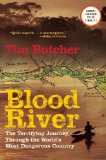Summary | Excerpt | Reviews | Beyond the Book | Read-Alikes | Genres & Themes | Author Bio

Critics' Opinion:
Readers' Opinion:
First Published:
Oct 2008, 384 pages
Paperback:
Sep 2009, 384 pages
 Book Reviewed by:
Book Reviewed by:
Fiona Lorrain
Buy This Book
This article relates to Blood River
For much of it's length, the Congo River forms the border between The Republic
of Congo and The Democratic Republic of Congo (map of Africa). Both countries and the
river are named for the early settlers to the area known as the Kongo people, and for the Kingdom of
Kongo which controlled much of the area between about 1400 and 1914:
The Republic of Congo
Also known as Congo-Brazzerville or the Congo, The Republic of Congo was a
former French colony which gained independence in 1960 and currently has a
population of a little over four million. From 1970 to 1992
it was run as a Marxist-Leninist single-party state, having signed a twenty-year
friendship pact with the Soviet Union. A democratically elected government took
control in 1992, but civil war in 1997 returned longtime President Denis Sassou-Nguesso to power leading to a period of ethnic and political unrest.
A peace agreement was reached in 2003 but the calm is tenuous and about half the
population live below the international poverty line of US$1.25 a day.
The Democratic Republic of the Congo
Conflicted by harsh colonialism, foreign exploitation, poverty, home-grown
corruption and violence, the Democratic Republic of the Congo, also known
as Congo-Kinshasa, has a long and troubled history.
With a land mass about one-quarter the size of the USA and a population of 69
million, it is the third most populous country in Africa, after Ethiopia and
Egypt. During the 16th and 17th centuries, merchants from Britain, Holland, Portugal
and France harvested the region for slaves, with the help of Kongo
intermediaries. As a result of the Conference of Berlin in 1885, Leopold II of Belgium formally acquired the area as his personal property,
naming it the Congo Free State. Thence followed a period of brutal and bloody
colonial rule as Leopold exploited the land for its rubber, reducing the
population by up to a half. Bowing to international pressure, reinforced by
writers such as Mark Twain (King Leopold's Soliloquy) and Joseph Conrad (Heart of Darkness), the
Belgium parliament took over control of the Congo from the king in 1908.
In 1960, the region gained its independence from Belgium and, like its neighbor
to the west, also named itself The
Republic of Congo, but the leadership soon fell apart and anarchy
descended. During this period, militant leader Joseph Desire Mobutu rose
to power, staging a military coup in 1965 and naming himself President. He ruled
the country - that he renamed Zaire - for 32 years, during which time his
mismanagement of of the economy and his ability to enrich himself at the expense
of the country's resources made his name a byword for kleptocracy.
With support from Rwanda and Uganda, a rebel soldier named Laurent-Desire Kabila
toppled Mobutu in 1997 and declared himself Head of State, Kabila changed his
country's name back to the Democratic Republic of Congo (DR Congo) but failing
to bring peace and order. An uprising in 1998 triggered five years of
civil war, exacerbated by the interference of Uganda, Rwanda and Zimbabwe. This
renewed anarchy claimed around 3 million lives. According to a UN panel in 2004,
the warring parties deliberately prolonged the war to plunder minerals and
timber. In January 2001, Kabila was assassinated and his son, Joseph Kabila,
succeeded him. Peace talks began as Rwandan and Ugandan troops withdrew. The
first free elections for four decades were held in 2006. Joseph Kabila won the
presidential vote, but peace is still a far cry with an economy in ruins and
continuing violence between Kabila's followers and opposition forces.
In January 2008, the government and rebel militia signed a peace pact aimed at
ending years of conflict in the eastern part of the country (bordering Rwanda),
but in April, Army troops clashed with Rwandan Hutu militias with whom they were
formerly allied in eastern Congo, leaving thousands of people displaced.
Interesting Link
An interview with Tim Butcher.
Filed under Places, Cultures & Identities
![]() This "beyond the book article" relates to Blood River. It originally ran in October 2008 and has been updated for the
September 2009 paperback edition.
Go to magazine.
This "beyond the book article" relates to Blood River. It originally ran in October 2008 and has been updated for the
September 2009 paperback edition.
Go to magazine.




To win without risk is to triumph without glory
Click Here to find out who said this, as well as discovering other famous literary quotes!
Your guide toexceptional books
BookBrowse seeks out and recommends the best in contemporary fiction and nonfiction—books that not only engage and entertain but also deepen our understanding of ourselves and the world around us.